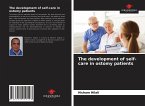It is noticeable the resistance that men have regarding health care. The established models of masculinity and the way male socialization occurs may be responsible for weakening or even driving men away from self-care concerns and the search for health services. The understanding of male singularities can provide gains for both men's health and health services. This research aimed to understand the meaning of health care attributed by men. For this, it sought to understand what men think about health care, to know the reasons that lead to the low demand of men for health services, understand how men feel within the health facility and, therefore, develop educational activity for the production of knowledge in men about health care.
Bitte wählen Sie Ihr Anliegen aus.
Rechnungen
Retourenschein anfordern
Bestellstatus
Storno








